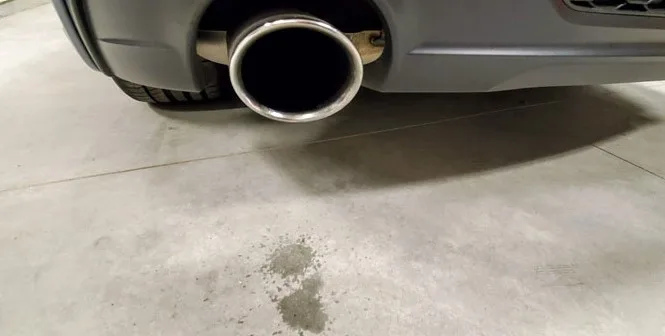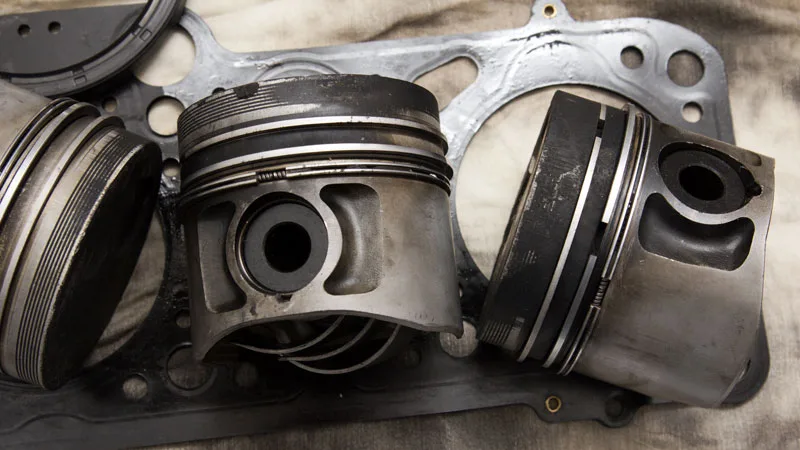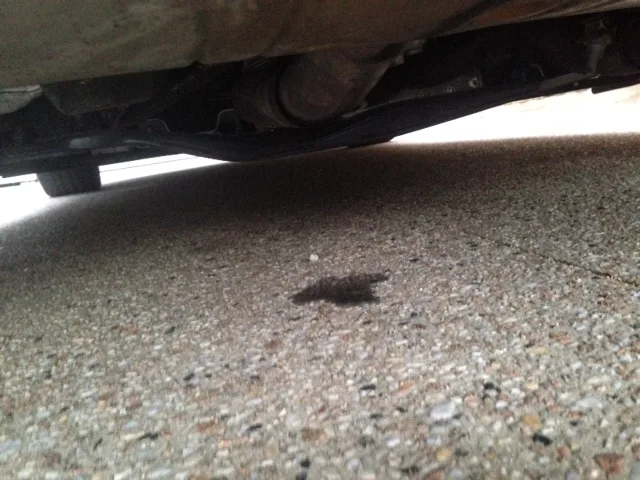Last updated on December 25th, 2023 at 11:30 pm
Discovering water leaking from your car’s muffler can be pretty confusing. You’re probably wondering why it’s happening, what it could mean for your car, and if it’s safe. Well, let’s dive into it! A muffler leaking water isn’t something you see every day, and it might worry you.
In this guide, we’ll unravel the reasons behind this issue and give you some solid advice on what to do if you’re facing this problem.
Picture this: you spot water trickling out of your muffler, and it’s got you scratching your head. Don’t worry; we’re here to shed some light on it.
By the end of this read, you’ll know exactly what’s going on and how to deal with a muffler leaking water in your car. Ready to get informed and tackle this concern head-on? Let’s roll!
Is Water Leaking from Your Muffler Normal?
Seeing water dripping from your car’s muffler, often known as “Muffler Leaking Water,” might seem worrying, but it’s quite common in how cars work.
When your car engine runs, it doesn’t just produce exhaust fumes; it also creates moisture. This mix of gases and moisture gets pushed out through the tailpipe as you drive.
Especially when you start your car, you might notice water dripping from the muffler. That’s mainly because the hot exhaust meets the cooler outside air, causing this dripping. Once your engine warms up, this dripping usually stops.
Usually, this water leaking from the muffler isn’t a big deal. It’s a natural part of how engines operate. But if you see too much water or notice strange sounds or smells from your car, it’s smart to get a mechanic’s opinion. Keeping an eye on these things helps make sure your car stays safe and healthy.
Recommended Post 10 Symptoms of an Exhaust Leak
Causes of Muffler Leaking Water

Leaking Water from Muffler due to Heat Condensation
In colder areas, seeing water leak from your car’s muffler is quite normal. When your car starts, the engine produces a lot of heat. Now, when this heat meets the cold air outside, something interesting happens.
The difference in temperature causes the water vapor in the exhaust to turn into tiny water drops. You might notice these drops coming out of the exhaust pipe, but they usually vanish in a few minutes.
Solution: So, what to do about this? It’s actually pretty simple. Before you drive off, let your car warm up for a few minutes. This helps the exhaust system get to a good temperature, reducing the water dripping from your muffler.
Giving your engine a bit of time to warm up helps the gases escape smoothly, which stops too much water from building up and leaking. This easy step can make your driving smoother, especially in the cold, and keeps your muffler in better shape. Easy, right?
Smoke and Water Emissions
A muffler leaking water can signal a bigger issue like a blown head gasket. This causes white smoke from your exhaust, weird air bubbles in the coolant tank, and your engine getting too hot for comfort.
Solution: To fix it, act quickly! Get your car checked at an auto repair shop as soon as possible. Ignoring a blown head gasket could lead to serious engine troubles. So, swift action is key to prevent more damage.
Imagine this scenario: water drips from your muffler, and suddenly, you’re worried about your car’s health. Understanding that this might hint at a blown head gasket can be nerve-wracking. But don’t stress! By acting fast and heading to the mechanic, you’ll safeguard your engine from potential breakdowns caused by this issue.
Recommended Post Car Blowing White Smoke But Not Overheating – Causes & What to do
Catalytic Converter Functioning
One reason for this is the catalytic converter. Its job is to make harmful emissions safer by turning them into less harmful substances, sometimes in the form of water vapor. So, if you see a bit of water dripping from your muffler because of the catalytic converter doing its job, there’s usually no need to panic.
Solution: When the water leaking from the muffler is because of the catalytic converter working properly, you don’t need to take any action. It’s just your car’s way of cleaning up its emissions. So, relax, no need to stress about this type of water leak!
This explains that seeing a bit of water coming out of the muffler because of the catalytic converter doing its job is totally normal and doesn’t require any immediate action from you.
Faulty Piston Rings

When water drips out of your muffler, faulty piston rings might be the sneaky culprit. These little rings, if not in top shape, can let out white smoke along with water through the exhaust. Also, watch out for weird smells—anything burning or strangely sweet could signal a more serious issue brewing.
Solution-wise, if you suspect those pesky piston rings are causing the water leak, it’s time for a trip to the auto shop. It’s a smart move to have your car checked thoroughly by the pros to fix up any issues linked to these rings. A tow to the repair shop might just save the day and your car’s health!
Symptoms Of a Muffler Leaking Water
Certainly! When your car’s muffler starts leaking water, it’s like a signal your car gives off that something’s not quite right. How can you tell? Well, here are a few signs to look out for:
Rust or Corrosion: Keep an eye out for any rusty or corroded spots on the muffler. It’s a red flag that says, “Hey, get this checked out!”
Loud Noises: Imagine your car sounding like it’s hissing, popping, or rattling. That’s what happens when water mixes with the exhaust gases due to a leaky muffler.
Reduced Engine Performance: Your car might not zip as it used to. You might notice it’s not as powerful, struggles to speed up, or it’s not using fuel as efficiently.
Unusual Smells: Ever caught a whiff of something weird inside your car, like gasoline or exhaust fumes? That could be another clue of a leaky muffler.
If you spot any of these signs, don’t wait! Get your car checked out pronto. Quick inspections and fixes can save you from bigger problems down the road and keep your car running smoothly.
Preventing Future Muffler Leaks: Vital Steps
- Regular Maintenance: Keep your car’s exhaust system in check with regular inspections. Catching issues early on can prevent bigger problems later.
- Avoid Deep Water: Stay away from driving through deep water as it can cause rust and corrosion in the exhaust, leading to leaks.
- Inspect for Leaks: Listen for unusual hissing sounds or check for any strange smells under your car. If you notice anything unusual, get it checked by a mechanic.
- Replace Rusty or Damaged Parts: Don’t wait to replace any rusty or damaged parts in your exhaust system. Weak parts can lead to leaks.
- Use High-Quality Parts: When replacing components, always choose good quality parts. Cheaper ones are more likely to fail and cause leaks.
- Regular Use: Driving your car regularly helps maintain the health of the exhaust system. Cars left idle for too long are more prone to issues.
Following these steps can significantly reduce the chances of dealing with a muffler leaking water in your vehicle.
FAQs
Is it easy to replace a muffler?
Replacing a muffler can vary in difficulty based on your experience with car repairs and your car’s make and model. Generally, it’s a straightforward job needing basic tools and some know-how. If unsure, it’s wise to get help from a professional.
Is it expensive to repair a muffler leaking water?
Fixing a muffler leaking water can vary in cost. If it’s rusted and needs replacing, it might be pricier. But if it’s a small hole, it could cost less. To know for sure, have a mechanic check and give you an estimate.
Can you drive with a leaking muffler?
Yes, you can still drive with a leaking muffler, but it’s not recommended as it can affect the performance of your car and even pose a safety hazard. It’s best to have it checked and repaired as soon as possible to avoid further damage.
How long should a muffler last?
The lifespan of a muffler can vary depending on factors such as the quality of the muffler, driving conditions, and maintenance. On average, a muffler can last between 3 to 4 years.
Conclusion
So, we’ve covered a lot about why your muffler might leak water, the signs to watch for, and what you can do to fix it. Plus, we talked about ways to stop this from happening again. Hope all this info helped! If it did, maybe share it with others who might need it too. Thanks for reading up on “Muffler Leaking Water”—appreciate your time!
Recommended Post Can You Drive A Car Without a Muffler?
FOLLOW US
